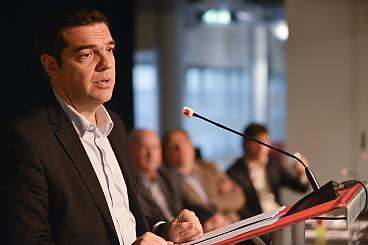Syriza wins elections, but what does it mean?
Syriza wins elections, but what does it mean?
The Greek parliamentary elections of 20th September brought an unexpectedly large victory for Syriza and its leader Alexis Tsipras. Whether this will be of any help to the ordinary Greek is the question, however. Much depends on the attitude of the troika of European Commission, ECB and IMF.

Did Tsipras really have to cave in to the Brussels Diktat last summer? Opinions differ about this on the left. In a previous article on SP International, also translated from the party’s monthly magazine Spanning, Dimitris Pavlopoulos argued that by accepting a third austerity package, Tsipras had taken the easy way out. In his view, Greece should quit both the eurozone and the EU so that its government could pursue its own economic and monetary policies. On the other hand, Noam Chomsky argues that Tsipras had little choice , given the lack of support from other countries. In addition he noted that to leave the euro would have been a risky step to take, because the country’s economic significance is relatively limited, it exports very little and pressure from outside would have become enormous. His own party, furthermore, was marked by disunity. Forty dissidents, including former Finance Minister Yannis Varoufakis, voted against the European debt agreement in July. Tsipras saw himself forced by circumstances to resign and call new elections, because he could no longer command a majority in parliament.
Good gamble
This gamble turned out well. Although the polls forecast a neck-and-neck race between Syriza and the conservative New Democracy, with 35.5% of the vote Tsipras’ party won a clear victory, with New Democracy far behind on 28.1% and the far right Golden Dawn, on 7%, a slight gain. Syriza was again able to form a coalition with the Independent Greeks who, despite losing some support, managed to exceed the 3% minimum for representation in parliament. Together they have 155 seats out of 300, a bare majority.
Low turnout
Tsipras can now continue to govern, but without the left dissidents, a number of whom formed the new party the People’s Union, which failed, however, to make the 3% minimum. A source of concern is that 43.4% of the electorate, some four million Greeks, didn’t bother to vote, despite the fact that it’s officially compulsory. Since the restoration of democracy in 1976 the turnout has never fallen so low, with 63.6% having been the figure in January of this year. The low turnout in September indicated that many of those who were having it the toughest as a result of the crisis have lost their faith in politics.
The question is also to what extent Syriza will have any political space. Tsipras hopes to be granted some debt relief by the end of the year, but in order to qualify his government must have met in full all the conditions of the Memorandum, as the debt agreement is known. It’s true that Tsipras is preparing to launch a fight against corruption and fiscal fraud, and that he wants to increase taxes on the oligarchs, but he may find himself forced to cut pensions, increase the pensionable retirement age, up VAT on the islands, and reduce financial aid to the unemployed. In addition the ongoing influx of refugees from Turkey into the Greek islands is likely to leave a heavy mark on the Greek economy and Greek society.
Debt relief
The next few months could well prove crucial. At the end of this year, negotiations with the Eurogroup will be renewed. If Tsipras is unsuccessful in these in his attempts to be offered debt relief, further parliamentary elections cannot be ruled out. These would bring the risk with them of a still lower turnout and increased electoral support for the extreme right Golden Dawn. The troika and Tsipras have bought time once again, but the Greek tragedy is very far from being over.
